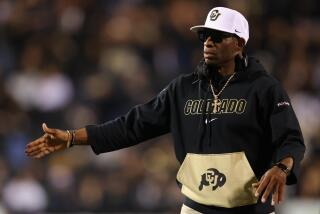LeMond Is Honored as Sportsman of Year
- Share via
MINNEAPOLIS — As terrible as 1987 was for pro cyclist Greg LeMond, 1989 has been tremendous.
LeMond was almost killed in a hunting accident in April 1987 and still has two pellets lodged in the lining of his heart. Yet it took only two years for him to return to the top of his sport.
He won his second Tour de France and world cycling championships. And what he calls “my dream year” was capped when he was named Sports Illustrated’s Sportsman of the Year.
LeMond, 28, the only American to win the prestigious race around France, is the first cyclist to receive the magazine’s honor in its 36-year history.
“It was really a very simple choice made by the individual himself on that Sunday in Paris, when, with 15.2 miles to go in a 2,025-mile race, he not only beat leader Laurent Fignon, he beat him by 8 seconds,” Mark Mulvoy, the SI managing editor who chooses the winner, told a news conference. “Everybody said the man did the impossible. Indeed, he did.”
LeMond said: “Every athlete in the U.S., maybe even the world, thinks Sports Illustrated’s Sportsman of the Year is no doubt the highest award anybody can ever have. A year ago, if anybody had told me I was going to have a year like this, I would have said they were crazy. This is definitely the highliht of my career.”
LeMond, who grew up in Reno, Nev., and now splits time between homes Kortrijk, Belgium, and the Minneapolis suburb of Wayzata, first won the Tour de France in 1986.
A year later, he was fighting for his life after being accidentally shot by his brother-in-law while turkey hunting in California.
“In ‘86, I was getting burned out from cycling,” LeMond said. “It’s hard to say it, but the accident probably prolonged my career. When it was taken away, I realized I didn’t do it for the money, I didn’t do it for anyone else except myself. Now I’m fine. I feel perfect.”
After recovering from the gunshot wound, he underwent an emergency appendectomy in July 1987. That was followed by knee and shin problems in 1988.
He wasn’t in top condition early this year, which started with a 27th in the Tour de Trump. He followed that with a 39th in the Tour of Italy, “exploding” in the mountains, a term that cyclists use for losing power.
He did give an inkling of future success when he came in second in the final time trial in Italy.
In the Tour de France, LeMond took the lead following a time trial in the fifth stage. He lost it in the Pyrenees, regained it with another time trial and lost it again in the Alps. On the race’s final day, he passed France’s Fignon to win by eight seconds -- the closest finish in race history.
A month later, LeMond won his second pro cycling title with a final sprint in the rain.
He parlayed his success into the richest contract in his sport’s history, a three-year, $5.5 million deal with France’s “Z” cycling team.
Mulvoy said other athletes considered for the award included: San Francisco 49ers quarterback Joe Montana; Los Angeles Kings center Wayne Gretzky, who won it in 1982; Oakland Athletics pitcher Dave Stewart, and West German tennis stars Steffi Graf and Boris Becker.
“But after I saw what Greg LeMond did that day, I knew it represented the very essence of sport,” Mulvoy said. “I knew it would have taken something incredibly heroic to beat that.”
Last year’s winner was Los Angeles Dodgers pitcher Orel Hershiser.
More to Read
Go beyond the scoreboard
Get the latest on L.A.'s teams in the daily Sports Report newsletter.
You may occasionally receive promotional content from the Los Angeles Times.










